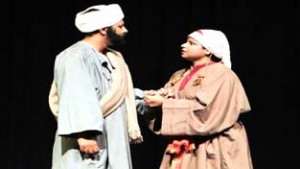Lalit Gupta

JAMMU, Apr 24: Vomedh Rangmanch’s play ‘Ek Aur Birbal’, the eighth performance of which was held today, has certainly emerged as a contemporary drama play which reflects the yearning of the young creative Kashmir Pandit playwrights to redefine identity for the younger generations born in exile by resurrecting role models from the history.
Staged on the second day of the ongoing theater festival organized by Unison Repertory, the Hindi play written by Rakesh Roshan Bhat, directed by Rohit Bhat, revolves around Pandit Birbal Dhar, one of the tax collectors who after refusing to levy more taxes on poor Kashmiris earns the wrath of Afghan Governor Azim Khan. Falsely accused of embezzlement, Birbal decides to free the masses by putting an end to barbaric Afghan rule by seeking the help of Maharaja Ranjit Singh. News of Birbal and his son’s escape to Lahore infuriates Azim Khan. He hunts down Birbal’s friends and sympathizers including local Muslims who had given shelter to Birbal’s wife and daughter-in-law.
On the recommendation of Raja Gulab Singh, Birbal succeeds in convincing Sikh Maharaja Ranjit Singh whose armies ultimately liberate Kashmir from Afghan tyranny. Birbal and his family emerge as true heroes who stood against the injustice and did not hesitate to make supreme sacrifices.
Today’s performance enacted without any set, came alive mainly due to competent acting by the cast which included Jatinder Joshi as Azim Khan, Arvin Tickoo as Birbal Dhar, Vinay Pandita as Mirza Kak, Rajni Bhatti as Birbal’s wife, Archana as Raj Kak’s wife, Rahul Pandita as Raj Kak, Jatin Raina as Anwar Khan, Puneet Jai Bali as Bassa Ram, Ramesh Pandit as Phool Singh and narration by Kamal Razdan.
The use of typical Pandit costumes by Anita Chandpur and well-executed make-up Shammi Dhamir greatly helped in creating the period feel and uniqueness of Kashmiri culture while bestowing individuality to each character. However, the overemphasis on sound and fluctuating light combination while the narrator filled up the spectators with the thread of historic details on a bare stage, at times gave the feel of light and sound programs at the historic monuments. The effective background score was designed by Kuldeep Raina (Sudeshi), while the Shiva linga in the Mahadev worship scene was designed by Veerji Sumbli.
Tomorrow, Rangyatri under the direction of Mushtaq Kak will stage Ismail Choonara’s play Broken Chair.

